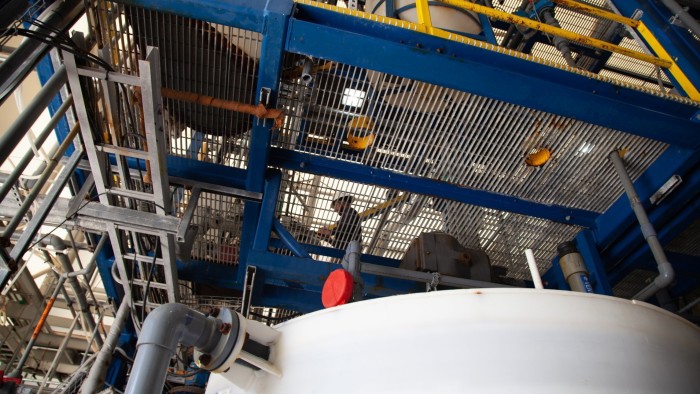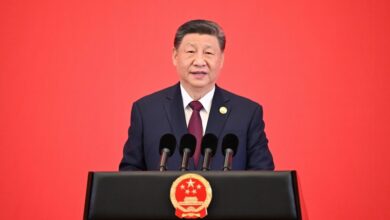US military leaders wade into fight over tax breaks for critical minerals

Unlock the White House Watch newsletter for free
Your guide to what Trump’s second term means for Washington, business and the world
Former US military leaders are lobbying Congress to reject a Republican push to repeal billions of dollars in tax credits for critical minerals, warning it would leave the country vulnerable to China.
A group of 23 retired four-star generals and admirals have asked Jason Smith, chair of the House Ways and Means Committee, to protect five tax breaks covering advanced manufacturing, clean vehicles and electricity production. The committee is expected to vote on the fate of some of the credits next week.
The former military leaders are members of Safe, a group focused on critical minerals and energy security which is funded via donors ranging from charitable foundations to industry and the US government. They include Admiral Dennis Blair, a former director of national intelligence, and General Joseph Dunford, the 19th chairman of the joint chiefs of staff.
The gathering fight is underscoring the unusual political alliances around the Biden-era Inflation Reduction Act, which provided lucrative incentives for green energy and critical minerals projects.
The law is drawing support from industry and even some Republicans whose districts benefit from the resulting projects. Meanwhile, environmental groups have protested mineral extraction, citing wildlife, water and ecological concerns.
Businesses have unleashed a multimillion-dollar lobbying campaign aimed at saving the IRA since Donald Trump won November’s presidential election. He has labelled the legislation a “green new scam” and vowed to repeal it with the help of Republicans in Congress. The president wants to use savings generated by scrapping the legislation to fund his administration’s planned tax cuts.
Repealing the IRA tax breaks could affect some of the 20 critical minerals projects recently fast-tracked by the Trump administration. These include lithium projects backed by Standard Lithium and Equinor in Arkansas and Albemarle in Nevada. Critical minerals such as cobalt, nickel and lithium are essential in electronic equipment such as wind turbines, electric vehicle motors, rechargeable batteries and military hardware.
Some Republican members of Congress have called on party colleagues to “fully repeal” the act, saying it could cost taxpayers $1tn over a decade and prop up renewable energy sources while displacing fossil fuels.
The lobbying follows concerns raised by the Department of Defense this year over China’s “disruption to critical US supply chains” by restricting exports of rare earths and the equipment used to process them.
In a letter to Smith and leaders of the House and Senate, the generals said curtailing the credits would threaten $125bn in investments in critical minerals projects essential to the defence industries. This would put 100,000 direct jobs at risk in 15 states and create opportunities for companies linked to China’s communist party to increase their global market share of key industries, they maintain.
“Repealing or weakening these provisions would not only stall the growth of critical industries — it would leave the United States vulnerable to supply chain manipulation by hostile regimes and further delay efforts to rebuild the nation’s defence industrial base,” the letter said.
Trump has already targeted spending under the law by ordering all federal agencies to “immediately pause the disbursement of funds under the IRA”. But the future of the IRA ultimately depends on a vote in Congress, which passed the legislation in 2022 under a budget resolution. This means only a simple majority vote in the House and Senate is required to repeal it, with no opportunities for a filibuster.
Republicans hold majorities in both houses of Congress but IRA supporters hope that some members of the party will oppose the repeal of the tax breaks, which support jobs in their constituencies.
On Thursday a dozen Republican lawmakers wrote a letter to Smith, arguing that IRA tax credits were important for Republican states with large clean electricity projects, nuclear power and battery storage, according to Reuters. However, the lawmakers said it was “not unreasonable” to incorporate a phaseout of the credits.
“The IRA will almost certainly survive but not in its current form,” said Frank Maisano, a partner in the policy and resolution group of Bracewell, a law and lobbying firm. “There are likely to be some items, like sunset provisions added to end certain tax credits sooner than originally anticipated, among other changes.”
https://www.ft.com/__origami/service/image/v2/images/raw/https%3A%2F%2Fd1e00ek4ebabms.cloudfront.net%2Fproduction%2F69146b64-5a64-4774-bbe7-b5bab9ab7c92.jpg?source=next-article&fit=scale-down&quality=highest&width=700&dpr=1
2025-05-10 12:01:00





